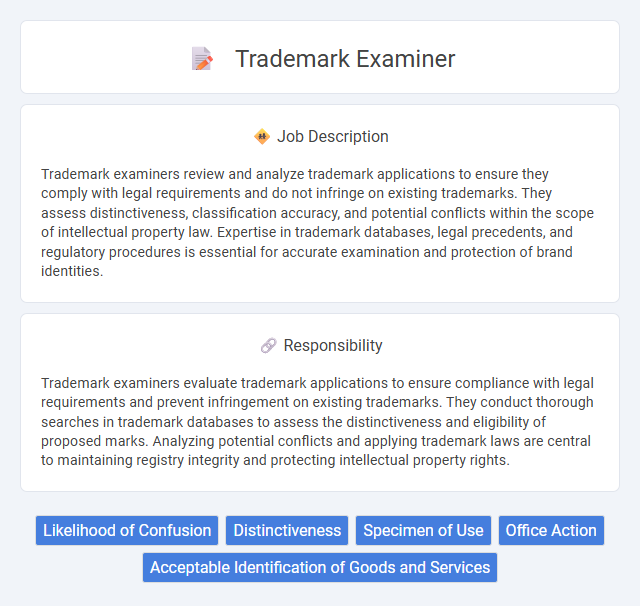
Trademark examiners review and analyze trademark applications to ensure they comply with legal requirements and do not infringe on existing trademarks. They assess distinctiveness, classification accuracy, and potential conflicts within the scope of intellectual property law. Expertise in trademark databases, legal precedents, and regulatory procedures is essential for accurate examination and protection of brand identities.
Individuals with strong attention to detail and an aptitude for legal and technical analysis will likely find a career as a trademark examiner suitable. People who thrive in structured environments and can manage repetitive tasks with consistency probably adapt well to the demands of this role. Those who struggle with prolonged focus or have difficulty interpreting intricate legal language may face challenges in meeting the job's requirements.
Qualification
A Trademark Examiner typically requires a bachelor's degree in law, intellectual property, or a related field, combined with specialized training in trademark statutes and regulations. Proficiency in legal research, attention to detail, and strong analytical skills are essential for evaluating trademark applications and ensuring compliance with trademark laws. Experience in intellectual property offices or legal environments enhances the ability to interpret prior rights and assess potential infringements effectively.
Responsibility
Trademark examiners evaluate trademark applications to ensure compliance with legal requirements and prevent infringement on existing trademarks. They conduct thorough searches in trademark databases to assess the distinctiveness and eligibility of proposed marks. Analyzing potential conflicts and applying trademark laws are central to maintaining registry integrity and protecting intellectual property rights.
Benefit
A Trademark Examiner job likely offers the benefit of developing specialized expertise in intellectual property law, which can enhance career prospects in legal and corporate sectors. Employees may probably gain valuable experience in analytical thinking and attention to detail through reviewing trademark applications and ensuring compliance with regulations. The position might also provide stable government employment with competitive salary and benefits packages.
Challenge
The role of a trademark examiner is likely to present significant challenges due to the complexity of intellectual property law and the need for meticulous analysis of trademark applications. Examiners probably encounter frequent difficulties in assessing potential conflicts with existing trademarks, requiring strong attention to detail and critical thinking skills. Navigating evolving legal standards and the volume of applications may increase the likelihood of demanding workloads and intricate decision-making processes.
Career Advancement
Trademark examiners play a critical role in reviewing trademark applications and ensuring compliance with legal standards, offering a strong foundation for a career in intellectual property law. Career advancement opportunities include promotion to senior examiner roles, supervisory positions, or specialization in complex cases related to trademark disputes and infringements. Skills developed in this field, such as legal analysis, communication, and attention to detail, also open pathways to roles in private law firms, corporate legal departments, or government agencies.
Key Terms
Likelihood of Confusion
Trademark examiners assess applications by thoroughly analyzing the likelihood of confusion between trademarks, examining factors such as similarity in appearance, sound, meaning, and the relatedness of goods or services. They review prior registrations and pending applications to determine potential consumer confusion, ensuring protection of trademark rights and maintaining market clarity. Their expertise in applying legal standards and precedents helps prevent trademark infringement and preserves brand distinctiveness.
Distinctiveness
A Trademark examiner evaluates applications to ensure the trademark's distinctiveness, which is crucial for legal protection and brand identity. They assess whether the mark can uniquely identify the source of goods or services without causing confusion with existing trademarks. Distinctiveness is categorized into arbitrary, fanciful, suggestive, descriptive, and generic, with stronger protection granted to inherently distinctive marks.
Specimen of Use
A trademark examiner meticulously reviews the specimen of use submitted with trademark applications to ensure it accurately demonstrates the mark's bona fide use in commerce. This specimen must clearly show how the trademark is applied to goods or services, such as labels, packaging, or advertising materials, meeting USPTO guidelines. Proper evaluation of the specimen of use is critical to prevent trademark registration based on non-genuine use claims.
Office Action
Trademark examiners review trademark applications to determine compliance with legal requirements and assess potential conflicts with existing marks. They issue Office Actions to notify applicants of any deficiencies, refusals, or required clarifications in the application. Responding accurately and promptly to Office Actions is critical to advancing the registration process and securing trademark protection.
Acceptable Identification of Goods and Services
Trademark examiners play a crucial role in assessing the Acceptable Identification of Goods and Services to ensure clarity and compliance with USPTO guidelines. Accurate identification facilitates proper classification under the Nice Agreement, reducing likelihood of refusal or opposition. Expertise in this area streamlines the examination process, enhancing trademark registration efficiency and protecting intellectual property rights.
 kuljobs.com
kuljobs.com